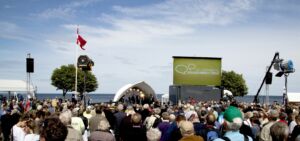News
Like the Godfather’s wedding favours, but with islands not gangsters
This article is more than 7 years old.
Dansk Ø-ferie chooses the occasion of Folkemødet to lobby the host about sharing the love with its fellow isles

The political equivalent of the Roskilde Festival has grown bigger and bigger since its foundation in 2011 by the former minister, Bertel Haarder (photo: New Øresund)
Blame it on the sunshine, blame it on DR’s recent obsession with unlawful killings, blame it on the World Cup, but media interest in Folkemødet, Danish politics’ answer to the Roskilde Festival, has been less intense than in previous years.
Nevertheless, while the politicians, lobbyists and other professionals in attendance might not have got the exposure at the four-day festival (June 14-17) that they would have liked, one clear winner is emerging: the island of Bornholm and its host city Allinge.
Record numbers descended on the Baltic isle this past week, bringing with them an unprecedented demand for accommodation, food and drink, and all manner of other services.
On Saturday, the festival attracted over 40,000 people – a record number that even exceeds the population of Bornholm, which just over 39,500 people call home.
Really, it wasn’t surprising. Bornholm has been enjoying a tourism renaissance of late, fuelled by a record number of people catching the ferry over in 2017.
This has partly occurred thanks to a 53 percent reduction in the price of a ticket phased in during the summer over the last two years.
Islands want a piece of the action
And now it would appear the other islands want in on the action, despite most of them being further away from Bornholm than Poland, Germany and the Russian enclave of Kaliningrad.
An organisation called Dansk Ø-ferie, which has the backing of chamber of commerce Dansk Erhverv and the likes of VisitDenmark and Dansk Kyst & Naturturisme, held a meeting at Folkemødet to develop an ‘all for one and one for all’ spirit among the islands.
It outlined a co-operation that would give the islands a common identity, branding platform and system for bookings, sales and check-ins.
“Right now the islands are a triangle that do not fit into the square,” said Lars Ramme Nielsen, the head of tourism and experience economics at Dansk Erhverv.
“I believe that by combining all of our beautiful islands under a destination, one can create a common strength that will benefit the individual islands throughout the country.”










































